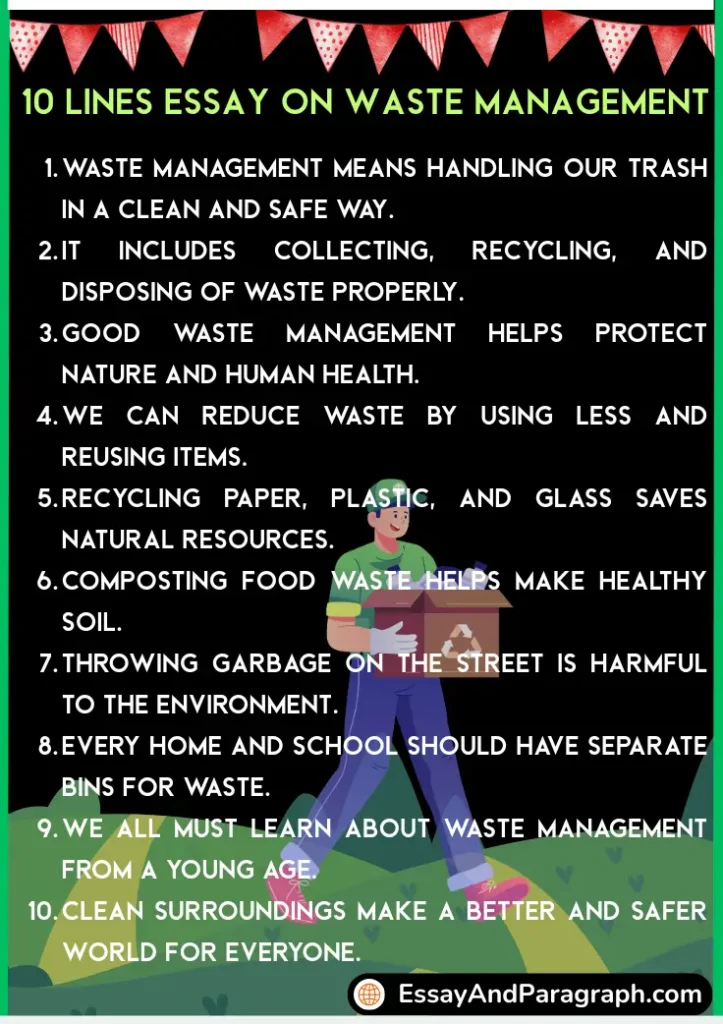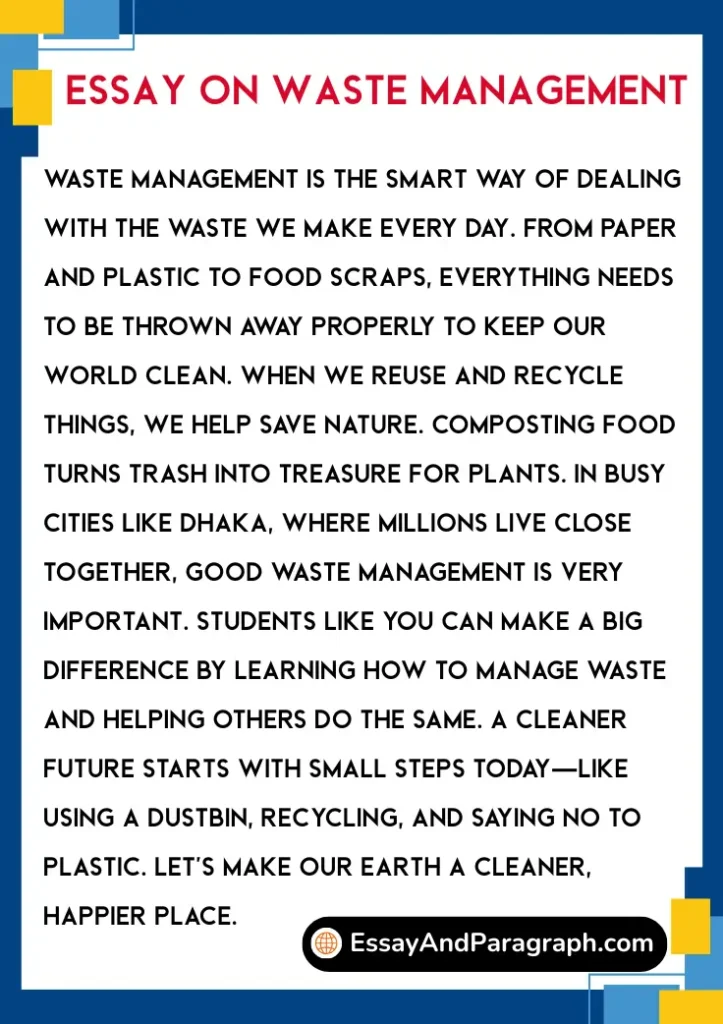Ever wondered what happens to the garbage we throw away each day? That trash doesn’t just disappear—it needs to be managed properly to protect our planet. Waste management is the way we collect, sort, reuse, recycle, and safely throw away things we no longer need. It helps keep our surroundings clean, our air fresh, and our health protected. In this article, we will learn how to write an essay on waste management for students using simple language and clear ideas.
10 Lines Essay on Waste Management for Students
Waste management means handling our trash in a clean and safe way.
It includes collecting, recycling, and disposing of waste properly.
Good waste management helps protect nature and human health.
We can reduce waste by using less and reusing items.
Recycling paper, plastic, and glass saves natural resources.
Composting food waste helps make healthy soil.
Throwing garbage on the street is harmful to the environment.
Every home and school should have separate bins for waste.
We all must learn about waste management from a young age.
Clean surroundings make a better and safer world for everyone.
 Essay on Waste Management
Essay on Waste Management
Essay on Waste Management – 100 Words
Waste management is how we take care of the garbage we create every day. It includes collecting, separating, reusing, and safely throwing away waste. If waste is not managed properly, it can cause pollution and make people sick. Recycling old things like paper and plastic helps save trees and water. Composting food waste turns it into healthy soil for plants. In big cities like Dhaka, where millions of people live, proper waste management is very important. By keeping our environment clean, we can live in a healthier and happier world. Everyone, even students, can help by learning to manage waste.
Essay on Waste Management – 150 Words
Waste management is how we take care of all the garbage we make. It includes collecting, reusing, recycling, and throwing away waste in a proper way. Every day we throw away food wrappers, paper, bottles, and more. If we throw them in the wrong place, it can make our streets dirty and cause sickness.
We can manage waste better by using less, reusing old things, and recycling items like plastic, glass, and paper. Composting is also helpful—it turns food waste into rich soil. In cities like Dhaka, where many people live, good waste management is very important.
As students, we can help by using dustbins, recycling school papers, and keeping our surroundings clean. Learning to manage waste now helps us build a cleaner and safer future for everyone. Waste management is not just for adults—it’s for all of us!
Essay on Waste Management – 200 Words
Waste management means handling all the garbage we produce in a safe and clean way. Every day, we throw away food wrappers, old clothes, papers, and many other things. If this waste is not taken care of properly, it causes pollution in the air, water, and soil. In large cities such as Dhaka or Chittagong, where over 10 million people live, waste collection and disposal is a big task.
Good waste management includes reusing items, recycling materials like plastic, paper, and glass, and composting food scraps. In schools, we can start by using separate bins for dry and wet waste. This small step teaches us the value of keeping our environment clean. When garbage is not thrown in the right place, it can clog drains and lead to flooding, especially during monsoon season.
By managing waste properly, we help protect animals, plants, and ourselves. Even simple acts like using both sides of paper, refusing plastic bags, and throwing waste in the right bin can make a difference. Waste management is everyone’s responsibility, including students like us.
Short Essay on Waste Management for Students – 250 Words
Have you ever walked past a dirty street filled with garbage and thought, “Why is this not cleaned up?” That’s where waste management comes in. Waste management is the process of collecting, sorting, and safely getting rid of waste materials. It plays a very important role in keeping our cities clean and our health safe.
Every day, families, schools, and businesses throw away food scraps, papers, plastic bottles, and more. If all this waste is dumped in the wrong place, it causes pollution and attracts insects and diseases. In Bangladesh, cities like Dhaka and Khulna face big challenges in managing the thousands of tons of waste produced daily.
Thankfully, there are ways to reduce waste. We can use less, recycle what we can, and compost food scraps. Recycling helps save natural resources. For example, recycling one ton of paper can save around 17 trees and 26,000 liters of water (source: Wikipedia). Composting turns food waste into soil that helps plants grow.
As students, we can help too. We can throw garbage in the right bin, use reusable water bottles, and tell others to keep their surroundings clean. Waste management isn’t just a job for the government—it’s something we all can do, starting right at home or in school.
Long Essay on Waste Management for Students – 500 Words
Have you ever noticed what happens to your lunchbox wrapper after you throw it away? It doesn’t vanish. It becomes part of the growing waste that cities struggle to manage. That’s why waste management is so important—it keeps our surroundings clean and helps protect our health and the planet.
Understanding Waste Management
Waste management is the process of collecting, sorting, transporting, recycling, and disposing of waste properly. It helps reduce pollution and keeps our environment safe. When waste is thrown anywhere, it can lead to water pollution, air pollution, and diseases. In a country like Bangladesh, with over 170 million people and dense cities like Dhaka (population over 20 million in the metro area), managing waste is a big challenge.
Why It Matters
Waste that isn’t managed properly can clog drains and cause waterlogging. During the rainy season, many areas in Dhaka face floods due to garbage blocking drains. Also, open waste attracts insects and spreads diseases. Clean streets and parks make life better for everyone, especially children and elders.
How to Manage Waste
There are many ways to manage waste:
Reduce: Use fewer things. Say no to plastic bags.
Reuse: Use old jars, clothes, and bags again.
Recycle: Turn paper, glass, and plastic into new items.
Compost: Turn food waste into healthy soil for plants.
Even burning waste in some places is dangerous, as it releases harmful smoke. That’s why modern cities use waste-to-energy plants or landfills designed to protect the environment.
Our Role as Students
Even students can help with waste management. At home or school, we can throw waste in the right bins—green for food waste and blue for dry waste. We can also reuse notebooks, avoid wasting food, and take part in clean-up drives. It’s fun and meaningful to work together for a cleaner world.
According to Dhaka North City Corporation, over 3,000 tons of solid waste is produced daily just in their zone. Managing this is not easy. That’s why every small action counts. If each student in the country helps reduce even a little waste, the difference would be huge.
Looking Ahead
The future depends on us. Learning about waste management today will help us build a cleaner tomorrow. Cleaner streets, healthy air, and less disease—all start with good waste habits. Let’s care for our planet by managing waste the right way. A cleaner world begins with us.
FAQs on Essay on Waste Management for Students
1. What is waste management and why is it important?
Waste management is the process of collecting, sorting, reusing, recycling, and safely disposing of waste. It’s important because it keeps our environment clean, prevents diseases, and protects nature. Without good waste management, garbage would pollute our rivers, roads, and parks. For example, cities like Dhaka generate thousands of tons of waste daily, and without proper systems, this could lead to major health problems and flooding during rain.
2. How can students help with waste management?
Students can help by using dustbins, separating waste, and avoiding plastic. They can also recycle paper, carry reusable water bottles, and compost food waste at home. Organizing clean-up events at school or in the neighborhood can also make a big impact. When students learn about waste early, they grow into responsible adults who care for the Earth.
3. What are the types of waste in waste management?
There are many types of waste: organic (like food), recyclable (like paper, glass, metal), and non-recyclable (like certain plastics). In cities, there’s also industrial and medical waste. Sorting waste into these types helps recycling and safe disposal. For example, mixing plastic and food waste makes recycling harder, so separating them is key.
4. Why is recycling important in waste management?
Recycling saves natural resources and reduces pollution. When we recycle one ton of paper, we save 17 trees, 26,000 liters of water, and lots of energy (source: Wikipedia). It also reduces the space needed for landfills. Recycling also helps reduce greenhouse gas emissions, making Earth healthier.
5. What is composting and how does it help?
Composting is the process of turning food and plant waste into rich soil. It helps reduce waste and improves the soil for gardening. You can compost banana peels, vegetable scraps, and leaves at home. It’s simple and a great way to reduce kitchen waste while helping plants grow.
6. What happens if we don’t manage waste properly?
If waste is not managed properly, it leads to pollution, disease, and even floods. Piles of garbage attract mosquitoes, flies, and rats. In cities like Dhaka, blocked drains from garbage cause waterlogging during rains. It also harms animals who eat or get stuck in plastic waste. That’s why proper waste management is a must.
Top 5 Quotes on Waste Management
“Waste isn’t waste until we waste it.” – Will.I.Am
“The Earth is what we all have in common.” – Wendell Berry
“Cleanliness is next to godliness.” – Proverb
“We do not inherit the Earth from our ancestors, we borrow it from our children.” – Native American Proverb
“What we throw away doesn’t go away.” – Annie Leonard
 Essay on Waste Management
Essay on Waste Management
Summary on Essay on Waste Management for Students
Waste management is the smart way of dealing with the waste we make every day. From paper and plastic to food scraps, everything needs to be thrown away properly to keep our world clean. When we reuse and recycle things, we help save nature. Composting food turns trash into treasure for plants. In busy cities like Dhaka, where millions live close together, good waste management is very important. Students like you can make a big difference by learning how to manage waste and helping others do the same. A cleaner future starts with small steps today—like using a dustbin, recycling, and saying no to plastic. Let’s make our Earth a cleaner, happier place.










